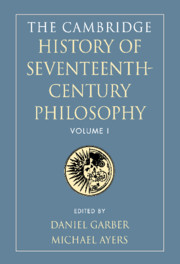Book contents
- Frontmatter
- Introduction
- I The context of seventeenth-century philosophy
- II Logic, language, and abstract objects
- 4 Logic in the seventeenth century preliminary remarks and the constituents of the proposition
- 5 Proposition and judgement
- 6 Deductive reasoning
- 7 Method and the study of nature
- 8 Universals, essences, and abstract entities
- 9 Individuation
- III God
- IV Body and the physical world
- V Spirit
- Bibliographical appendix
- Bibliography
- References
9 - Individuation
from II - Logic, language, and abstract objects
Published online by Cambridge University Press: 28 March 2008
- Frontmatter
- Introduction
- I The context of seventeenth-century philosophy
- II Logic, language, and abstract objects
- 4 Logic in the seventeenth century preliminary remarks and the constituents of the proposition
- 5 Proposition and judgement
- 6 Deductive reasoning
- 7 Method and the study of nature
- 8 Universals, essences, and abstract entities
- 9 Individuation
- III God
- IV Body and the physical world
- V Spirit
- Bibliographical appendix
- Bibliography
- References
Summary
Seventeenth-century philosophers discussed several related questions under the heading ‘individuation’, although they did not always distinguish clearly between them. Four of these questions in particular will be considered in this chapter. First, there is the metaphysical question about what it is that makes an individual the individual it is and distinguishes it from all other individuals of the same kind; this is the question of a ‘principle of individuation’, of an intrinsic cause of individuality in the things themselves. Second, there is the epistemological question of how we know individuals and their distinctness from one another; this question concerns the basis on which we pick out individuals and distinguish between them. The third question concerns identity through time, the conditions of an individual's remaining the same over time even though that individual may have undergone some change. The fourth question arises from the distinction between the metaphysical problem of what constitutes the identity of a being and the epistemological problem concerning our criteria for making a judgement about a being's identity at different points in time. The question of individuation (what brings about individuality at any one time) and the question of identity (what constitutes sameness at different points in time) were often discussed in connexion with each other; sometimes the emphasis was on individuation, and at other times it was on identity through time and partial change.
Problems of individuation and identity had been discussed extensively long before the seventeenth century. Hence, the search for a principle of individuation was a standard topic in mediaeval philosophy. And the mediaeval disputes about the principle of individuation formed a large part of the background to seventeenth-century discussions of the issue.
- Type
- Chapter
- Information
- The Cambridge History of Seventeenth-Century Philosophy , pp. 212 - 262Publisher: Cambridge University PressPrint publication year: 2000
References
- 14
- Cited by

